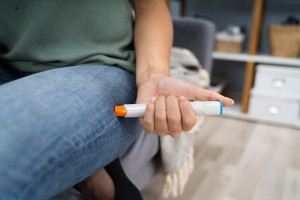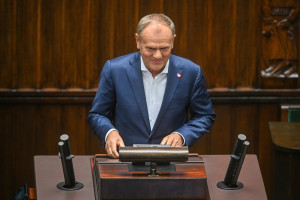Cheaper drugs will be introduced earlier. The biggest change negotiated by Poland in 20 years

- Poland has completed negotiations on the EU pharmaceutical package
- One proposal involves a mechanism that would allow countries to call on a company to introduce drugs into a given market and to provide supplies in sufficient quantity and form to meet patient needs.
- The mechanism includes a sanction: if the company does not respond to this request, the consequence may be the loss of the period of market exclusivity in a given country
- Another issue breaks the current monopoly of the original drug. The period of market exclusivity is shortened by one year. This is how much earlier the generic company will be able to deliver cheaper drugs to the market
- There is also a strengthened Bolar exception, which allows generic companies to prepare to introduce drugs to the market while patent protection is still in force.
- I am pleased and proud to announce that the goal of the Polish presidency in the area of health care has been achieved. The Council of the European Union accepted the compromise proposed by Poland on the pharmaceutical package . This is truly a huge success of the Polish presidency. We have brought to an end the negotiations that lasted almost two years and achieved a consensus that many people said was almost impossible - announced the Minister of Health Izabela Leszczyna during a conference convened at the ministry (6 June 2025).
The EU pharmaceutical package is hundreds of pages of legislation contained in two main legal acts. In the directive of the European Parliament and of the Council and the regulation of the European Parliament and of the Council. The directive was first adopted in 2021, the regulation in 2004.
The current changes are the largest reform of the package in over 20 years . The proposed solutions are intended to improve the availability of medicines for patients, create predictable conditions for the pharmaceutical sector to produce and distribute medicines, and encourage innovation. The regulations regulate the method of registration of medicinal products and trade.
Since Poland is presiding over the EU Council this half-year, the effort to lead the negotiations fell to us. With what effect?
- What was one of the key issues and new things that was added to the current legislation was the strengthening of access to the markets of the entire European Union - said Deputy Minister of Health Katarzyna Kacperczyk.
Currently, pharmaceutical companies are calculating which markets are more profitable to enter first. For this reason, there are large differences in the availability of new drugs between individual countries.
To equalize availability across the European Union, the proposal includes a mechanism that would allow countries to call on a company to introduce drugs to a given market and provide supplies in appropriate quantities and forms to meet patient needs.
Change of exclusivity time. It will be 8+1- The company must submit a reimbursement application or enter the public procurement procedure and establish a plan for the supply of the drug to a given market. The mechanism includes certain sanctions: if the company does not respond to this request, the consequence may be the loss of the period of market exclusivity in a given country - explained Minister Kacperczyk.
The second element, which was very important in working out the final compromise, was the creation of stable and predictable conditions for the pharmaceutical sector, drug production and their distribution. On the one hand, it was about supporting innovation and the competitiveness of the European Union. On the other, it was about creating the possibility of faster introduction of generic drugs to the European market, i.e. cheaper alternatives to very expensive and costly drugs.
So while the data exclusivity period has been maintained at 8 years, the market exclusivity period has been shortened by one year . Until now, companies could benefit from a two-year period of such protection. This meant that no other company could introduce its equivalent product during that time. A year of monopoly on the pharmaceutical market means the possibility of maintaining higher prices.
- This change means benefits for both generic companies and the public payer, because the implementation of cheaper drugs will be much faster and will relieve the burden on healthcare systems, and at the same time the patient will gain access to new drugs faster - the deputy minister explained.
Another nod to the generic industry is the strengthened Bolar exception, a rule that allows generic companies to prepare to introduce drugs to the market while patent protection is still in effect, whether it is filing registration applications, reimbursement applications, conducting HTA analyses, or participating in tenders. This means that a generic company can prepare a drug to enter the market with it as early as the day after protection expires.
The first trilogy is scheduled for June 17thSome of the proposals also concern strengthening innovative companies. These entities will receive additional protection in exchange for introducing a drug to the market that protects patients in newly emerging diseases, or that is more effective than existing therapies . The condition to meet is conducting clinical trials of this drug in at least two European Union countries. The package also contains new solutions that address the issues of orphan and pediatric drugs.
Another area that responds to the health needs of patients is the introduction of the so-called voucher mechanism , which is to stimulate the development of new antibiotics. It will take the form of a transferable voucher, which the inventor of the antibiotic can sell to another company. The buyer can extend the market exclusivity of any of their drugs.
You can read more about this solution: Transferable vouchers and antibiotics in a subscription like movies on Netflix
A number of solutions have also been introduced to monitor stocks and better manage drug shortages. Countries have been required to prepare special plans to assess the risk of drug shortages . The proposals also provide for cooperation between EU countries and the European Commission in the event of shortages.
- The pharmaceutical package that we managed to complete concerns regulatory issues, production and distribution, introducing medicines to the market, crisis management, medicine prices and access for patients. The package eliminates a number of regulatory barriers, shortens the drug registration period, strengthens the role of the European Medicines Agency in supporting innovative companies in terms of science and regulation - enumerated Minister Kacperczyk.
What's next?
After the compromise is adopted, Poland will start negotiations with the European Parliament and the European Commission . The first trilogues are scheduled for June 17. After us, Denmark will take over the presidency from July 1. If there are no delays in the work, there is a chance that the amended pharmaceutical package will be adopted in the autumn.
Copyrighted material - reprint rules are specified in the regulations .
rynekzdrowia












